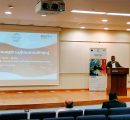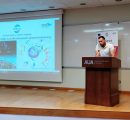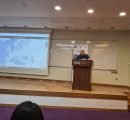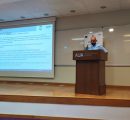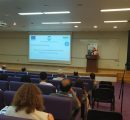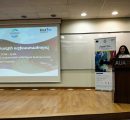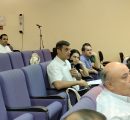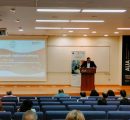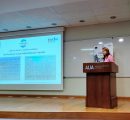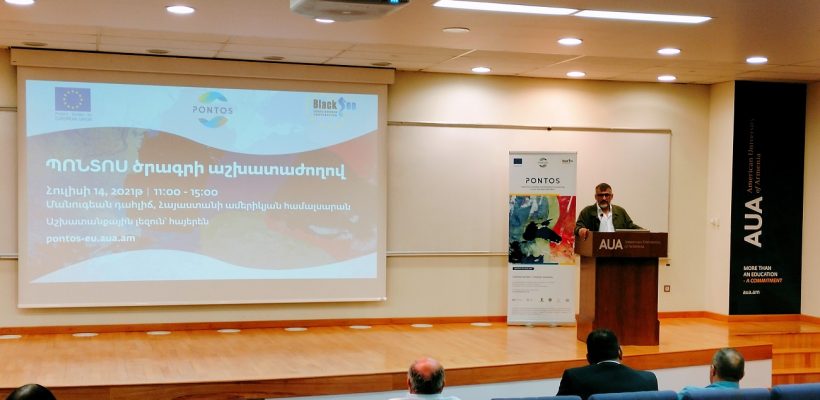
PONTOS Project Brainstorming Session Held in Armenia
3 min readYEREVAN, Armenia — On July 14, 2021, the American University of Armenia (AUA) Acopian Center for the Environment organized a brainstorming event within the scope of the Copernicus assisted environmental monitoring across the Black Sea Basin — PONTOS project. This was one of the four brainstorming sessions organized within the PONTOS project along with those in Greece, Ukraine, and Georgia.
The event aimed to introduce stakeholders to the PONTOS project, its objectives, expected outputs, and results. The topics covered during the session included an overview of Earth Observation (EO) technologies, Copernicus products, and their application in environmental monitoring, as well as presentations of the findings from the project pilot site assessment of Lake Sevan.
Among more than 50 participants attending the workshop were policymakers, representatives of small and medium enterprises, NGOs, national and local governments, scientific and educational institutions, as well as individual experts. They highlighted the importance of the project locally and for the broader region, the value of this partnership, and the crucial impact the project has on society.
Welcoming remarks were delivered by Alen Amirkhanian, director of the AUA Acopian Center for the Environment, Vrezh Galoyan, deputy head of the Environmental Protection and Mining Inspection Body (EPMIB) of the Republic of Armenia, and Astghik Hayrapetyan, a specialist from the Department for Coordination of Loan and Grant Programs, Office of Deputy Prime Minister Mher Grigoryan. In her remarks, Hayrapetyan underscored the strategic significance of the project for the Black Sea Cross Border Cooperation (BS CBC) and, in that context, its inclusion in the upcoming BS CBC deliberations as an example of a successful project for the development of new initiatives.
The brainstorming sessions led by the Armenian researchers of the PONTOS project included an introduction about the exploitation of EO technologies, Copernicus products and services, and their application in environmental monitoring, followed by presentations of the research activities in the Armenian pilot site, their outcomes, and near-term deliverables. Questions from the audience and discussions followed each presentation. Participants also had the opportunity to share information on other initiatives and projects that could create added synergies with PONTOS, to be explored further in separate meetings and discussions.
In the session dedicated to the PONTOS platform, Aghavni Harutyunyan, PONTOS project manager at AUA, presented its tools, structure, services, value, and significance. “The unique qualities that our platform offers is its accessibility to a broad spectrum of audience, both professionals and non-professionals. One does not need to have a technical or coding background to be able to process satellite data. The platform incorporates various applications and tools for the users in an easy-to-access format and easy-to-use online services. It requires registration, though the products are accessible free of charge.” A quick survey was distributed to the attendees to provide feedback and share their needs for consideration by the project team in further research and incorporation in the PONTOS platform.
While the stakeholders will have access to the platform early in 2022, the final version of the PONTOS platform is stated to be released in December 2022.
Copernicus assisted environmental monitoring across the Black Sea Basin-PONTOS is a 30-month project funded by the European Union’s ENI CBC Black Sea Basin Programme 2014-2020. The PONTOS will make information about the Black Sea environment from the EU Copernicus Earth Observation platform accessible to scientists, policymakers, citizens, and other relevant stakeholders. It will utilize information technologies to automatically retrieve Copernicus products, couple them with national or regional infrastructures for data acquisition and processing, and provide monitoring services for the Black Sea and the surrounding environment in a transboundary, standardized, and homogenized manner. The environmental monitoring system to be developed will be tested in pilot sites across Armenia, Greece, Georgia, and Ukraine.

